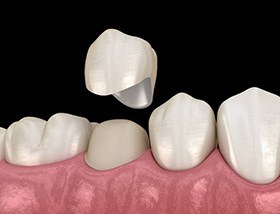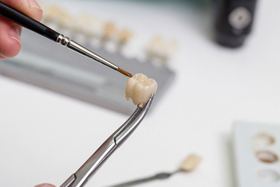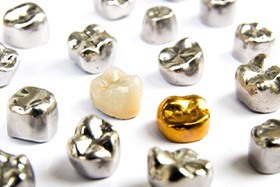
Dental Crowns – Torrington, CT
Restore the Form and Function of Damaged Teeth
Do you have one or more teeth that are suffering from injury, decay, or general wear and tear? A customized dental crown may be the ideal way to revitalize a damaged tooth. At Torrington Dental Care, we are proud to offer porcelain dental crowns that blend in beautifully with natural teeth. The results feel and appear remarkably lifelike. Every crown we provide is custom-made for each patient to produce functional, aesthetically pleasing results.
Why Choose Torrington Dental Care for Dental Crowns?
- Custom-made for every patient
- Fabricated using strong & natural-looking dental porcelain
- E4D: High-quality crowns in just one appointment
What Are Dental Crowns?

Dental crowns are tooth-shaped restorations. They fit over the entire visible portion of a tooth to strengthen it and protect it from damage and restore its form and function. Crowns can be made out of various materials, including different types of metal and porcelain-fused-to-metal (PFM). In our practice, we favor all-porcelain crowns because they offer superior aesthetics and outstanding durability. Porcelain is also an excellent choice for patients with metal sensitivities.
Benefits of Dental Crowns

Dental crowns have the potential to provide several outstanding benefits. For example, they can work alongside root canal therapy to save a damaged tooth from extraction. They can also function as part of a fixed bridge to replace a missing tooth altogether. Porcelain or PFM crowns even offer remarkable aesthetics and can improve the overall appearance of your mouth. Dental crowns are sturdy enough to stand up to the rigors of everyday eating. In most cases, they last for at least 10 years before replacement becomes necessary.
Indications for Dental Crowns

Do you suspect that you may need a dental crown? When you visit us for a consultation, we will carefully evaluate your oral health and recommend a treatment. We may recommend a dental crown for any of the following reasons:
- A tooth is badly decayed, and a filling, inlay, or onlay would not be able to adequately restore it.
- One of your teeth recently underwent root canal therapy, and it requires a crown to protect it against further damage.
- One of your teeth is broken and needs a crown to hold it together.
- You have cracked tooth syndrome. The crown can protect the sensitive tooth and prevent it from suffering further damage.
- You have an old, damaged crown that needs to be replaced. Or, you may want to replace an old metal crown simply to improve the way your teeth look.
- One of your teeth is badly misshapen or discolored, and you wish to receive a crown for cosmetic purposes.
Start to Finish Dental Crowns

In many cases, we are able to provide start to finish dental crowns right here in our office. First, our team will use local anesthetic to make sure you are comfortable. Then, your dentist must prepare the tooth by removing a portion of its enamel. This step helps to ensure that the new crown fits well and will not interfere with your natural bite. After the tooth is ready, we will use advanced digital impression technology to scan the tooth and the dentition around it. We use that data to design your custom crown. Then, we put our advanced E4D technology to work. It includes an in-practice milling unit that can create a brand-new restoration our of high-quality dental porcelain in mere hours. After the crown is ready, we will verify that it fits perfectly before we permanently place it in your mouth.
If you opt for a metal or PFM crown, the process is a bit different. You will have to wear a temporary crown while a dental laboratory creates the crown. Then, you will come back for a second appointment, wherein we will place the crown on your tooth.
Understanding the Cost of Dental Crowns

The cost of your dental crown will depend on the material it is made of and other factors. Many dental insurance plans do offer coverage for crowns — our team can help you figure out how your benefits apply. If you need financing to help you pay for the balance of your treatment, we can assist you with that. Keep in mind that a high-quality crown can save you money in the long-term because it can prevent the need for an extraction and future tooth replacement.
Factors that Affect the Cost of Dental Crowns

Some factors that can influence the cost of dental crowns include:
- The complexity of your case. You might require root canal therapy or other treatments prior to receiving your crown, which could significantly increase the total cost of your care.
- The material used to make your crown. Crowns can be made out of different types of metal, porcelain-fused-to-metal, and 100% porcelain. Each material has its own pros and cons, as well as its own cost.
- The method used to make your crown. We can make porcelain crowns right here in our office using advanced E4D technology. For other materials, we have to coordinate with a trustworthy dental lab. These different crown creation methods can have a bearing on your total bill.
Keep in mind that cheaper crowns are not always better! Quality is important for what goes in your mouth; you want a restoration that looks good and fits in well with your bite.
Does Dental Insurance Cover Dental Crowns?

In most cases, yes, dental insurance does cover dental crowns (the most common exception is if a crown is purely for aesthetic purposes). Usually, this treatment is classified as a major service, so around half of its cost might be covered, up to the amount of your policy’s annual maximum. Our practice welcomes dental insurance, and we will do all we can to help you understand your benefits and use them in the most advantageous way possible.
Other Options for Making Dental Crowns Affordable

Beyond insurance, there are a couple of provisions that may make it easier to afford your crown:
- Essential Dental discount plan. Designed for patients without insurance, this affordable discount plan can reduce your out-of-pocket cost for virtually all the services available in our practice.
- Most patients qualify for third-party financing through CareCredit. The application process is fast and easy, and you might be able to choose a monthly payment amount that fits in with your budget.
A crown can play an important role in your oral health! To learn more about this procedure and its financial aspect, get in touch with the Torrington Dental Care team today.
Dental Crowns FAQs

If you need a dental crown, our Torrington team is ready to serve you. Before you book a restorative consultation, though, you might be eager to learn more about the road ahead. To help you gather information, we have put together a list of FAQs about this treatment. If your questions are not addressed here, give us a call. We will be happy to speak with you.
What Are Dental Crowns Made Of?
Crowns can be constructed out of various materials. For example, some dentists offer metal crowns, which may be made out of silver, gold, nickel, palladium, or chromium. Metal crowns are quite durable, but many patients dislike the way they look. Some crowns have a metal base and a porcelain overlay. These porcelain-fused-to-metal (PFM) crowns are both durable and attractive. However, they can develop a dark line at the base after several years of wear and tear.
Here at Torrington Dental Care, we prefer porcelain crowns because they look and feel as lifelike as possible. They are so natural-looking that no one may ever be able to tell that your smile had to undergo some restorative work.
How Long Do Dental Crowns Last?
Crowns have an average life expectancy of 5 – 15 years. Of course, how long your crown lasts will depend on a few different factors, including what it is made out of and how you care for it. You should stick to a thorough oral hygiene routine, regularly visit us for cleanings and checkups, and avoid bad habits like smoking and nail-biting.
How Do You Know When a Dental Crown Needs to Be Replaced?
To find out for sure if a crown needs to be replaced, you should consult with your dentist. After a visual examination and some X-rays, they can determine if your restoration is nearing the end of its usefulness.
Here are some indications that you might need to schedule an appointment:
- If the tooth under a crown is in pain, it might have new spots of decay that can only be addressed by removing the crown.
- If the crown feels loose or unsteady, it might be damaged.
- An unsightly appearance. If the crown has lost its original beauty, you may be able to get it replaced.
Does It Hurt to Get a Dental Crown?
During the tooth preparation process, your dental team should numb your mouth so you feel little to no discomfort. If you have a sensitive mouth or struggle with dental anxiety, it may be possible to sedate you as well. Once your crown is in place and the local anesthesia has worn off, you may notice an increase in sensitivity. Usually, this issue wears off within a few days.
Keep in mind that any discomfort you experience during the treatment process will be well worth it. A crown may prevent some severe toothaches!